This year’s AFI Fest featured a treasure trove of discreet indies, lavish foreign film outings, triple-A Hollywood features, and Oscar hopefuls. Film section editor Sergio Zaciu took to the festival with guest contributors Alexander Larios, Kevin Cookman, Reid Antin, and JM. Below are our thoughts on what we saw (starting with the films that left us cold, and ending with those that had us begging for more).

NEVER LOOK AWAY
Director: Florian Henckel von Donnersmarck
Genre: Drama
O, Florian! One cannot help but feel disheartened to see the director of the brilliant THE LIVES OF OTHERS turn in a 188-minute, overlit soap opera—the experience of which is akin to viewing sappy German television. The great irony is that Donnersmarck introduced his film by touting that Hollywood only makes movies like 50 SHADES OF GREY, and he was here to make a real movie. Turns out, he made the most Hollywood film of the festival—the kind that used to get awards for saying nothing substantive about important historical events. Keep that free champagne coming, German Embassy! You’re going to need it for your Oscar campaign as you push this trite, absurd, misguided attempt at an epic that some fools may vote for. The one good thing I will say is that I wasn’t bored while watching this, and I guess that’s something. But there was never a moment that I didn’t want to laugh at—from the CGI burning baby carriages to those wild and crazy modern art students (it’s the ‘60s, man!). The music tries to trick you into thinking this is emotional. Pro tip: It isn’t.
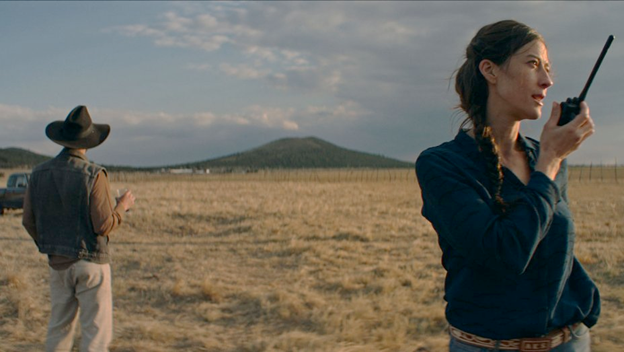
OUR TIME
Director: Carlos Reygadas
Genre: Drama
It has been six years since Mexican filmmaker Carlos Reygadas’ last outing and his return to the scene with OUR TIME proves we may have been better off had he stayed away. His style is one to immediately be suspicious of: like some amalgam of Malick-Tarkovsky-Weerasethakul, Reygadas goes well out of his way to approach the world with curiosity, placing his camera in odd spaces (the irony here, of course, is that his strategy is all too familiar and phoned in). But what is uniquely terrible is just how solipsistic and literally masturbatory the film appears. Reygadas casts himself and his family as the lead performances in the drama, which follows a poet and sometimes rancher whose open relationship with his wife causes friction when she becomes involved with one of his white, American farmhands. Cinema’s greatest auteurs have never been above cuckoldry, but for Reygadas, this film becomes an exercise in interior discovery, a three-hour exploration into the unknown parts of himself. Though the programmer introducing the film insisted upon Reygadas’ respect for the audience, OUR TIME is the worst kind of artistic arrogance, a film quite literally made for himself and nobody else, because no one else could ever be vain enough to take it seriously.
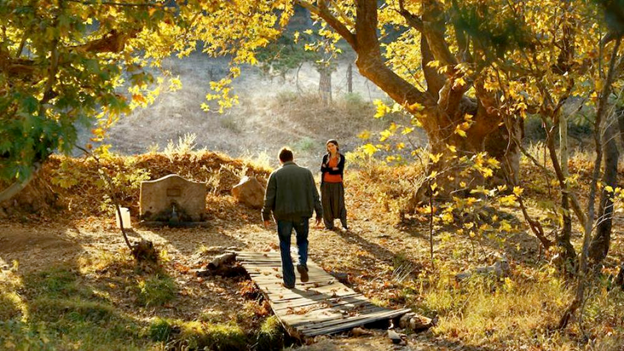
THE WILD PEAR TREE
Director: Nuri Bilge Ceylan
Genre: Drama
In the two decades since his debut feature KASABA, Turkish filmmaker Nuri Bilge Ceylan has steadily become a mainstay on the international art circuit, with his last two features, ONCE UPON A TIME IN ANATOLIA and WINTER SLEEP both taking home top prizes at their respective years at Cannes. Suffice it to say, however, THE WILD PEAR TREE is all bluster, yet another three-hour meditation on the search for a free art uninfluenced by pressures from the state, from society, from peers, and from parents. It’s a selfish film, both in its text—how fitting that the protagonist, an insufferable young college graduate seeking to publish a book titled The Wild Pear Tree is a reader of Camus—and in how absorbed it is in its own empty style. Ceylan rarely lets the camera rest: long discussions are punctuated by the huffing and puffing of grand gestures, sweeps, and pans. It is relentless, but also entirely callous, with such an intense vanity in teasing out the struggle his character endures in publishing his book (oh, if only we thought of the artists!). Looking at the list of films this year, this is probably the biggest bluff of the lot.

MARY QUEEN OF SCOTS
Director: Josie Rourke
Genre: Drama
Closing off this year’s AFI Fest was a premiere so throwaway, I’ll be shocked if I remember it a month from now. MARY QUEEN OF SCOTS, a madly ambitious debut feature by director Josie Rourke, introduces itself with such bravado that it’s almost impossible not to at least expect competent Oscar bait: a confident, albeit silly, attempt at showing us the wokest of all English queens. Why anyone thinks that we live in a political climate that would want us to aspire to the goodwill of the British monarchy is beyond me, but there’s so much more that MARY QUEEN OF SCOTS does wrong that it’s not even really a priority. Believe it or not, the endless slew of scenes that show us how tolerant, not-homophobic, and anti-patriarchal Saoirse Ronan’s titular protagonist was is not the most ridiculous directorial decision in this picture. Few period pieces feel like a filler episode of television well into its fifth season, but by the time this ended and I realized that Margot Robbie was hardly even in it, I couldn’t shake the feeling that MARY QUEEN OF SCOTS can barely even consider itself a finished film.
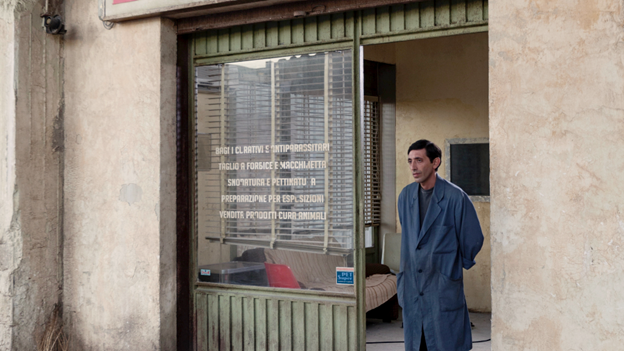
DOGMAN
Director: Matteo Garrone
Genre: Drama
Matteo Garrone always paints with a warm palette, but it has never been as ugly as it is here. One would think that shooting in a small Italian beach town would at least yield an attractive canvas, but the setting of DOGMAN is, perhaps appropriately, dilapidated and bland. It is through this wasteland of a city that we follow the titular Dogman, part-time dog groomer and part-time companion and drug dealer to a small town gangster with a short temper and a knack for cat burglary. However unique a premise this may appear, Garrone doesn’t appear to have thought these ideas very far: everything in the narrative is told in broad strokes and never realized in any meaningful sense, a paper-thin scenario leading us to the Dogman’s breaking point, when he just won’t take it anymore. At roughly two hours long, DOGMAN has so very little to say, and what it does say is tainted with such misandry and a crypto-fascist view of humanity that it’s hardly worth listening to anyway.

RAY & LIZ
Director: Richard Billingham
Genre: Drama
Given the cultural capital (and literal capital) attached to films exploitative of poverty, it was only so long before equally suspect fine artists decided to cash in on the craze. English photographer Richard Billingham has long made a career out of the aesthetic approach to poverty, and his feature debut, RAY & LIZ, continues this trend, illustrating his parents’ fall from middle class standing in Thatcher’s Britain in two episodes from his childhood. You wouldn’t know it, though, for this point is completely omitted; never are the social conditions in which his parents live mentioned even partially. The frame Billingham returns to again and again is an image of his father slightly masked by a billowing curtain, producing an aesthetic mystique (“Who is this man? How did he get here?,” the film appears to ask again and again). The answer he gives comes in the form of his close eye on the hands of his parents, moving objects, smacking their relatives, etc. What this amounts to is clear: a depiction of poverty as the result of a series of choices one makes, independent of larger questions of political economy or social frameworks. Though fortunately sparing us of even more exaggerated emotional or aesthetic appeals—Billingham is no Sean Baker, at least not yet—RAY & LIZ still fits neatly on a list of the most vile trends in contemporary cinema today.

UNDER THE SILVER LAKE
Director: David Robert Mitchell
Genre: Neo-Noir/Comedy
Many will speculate A24’s reasons for twice delaying David Robert Mitchell’s follow-up to cult favorite IT FOLLOWS, but upon its April 2019 release, it should become glaringly clear that UNDER THE SILVER LAKE is a film running away from the contemporary social climate, clamoring for a release window wherein the wokest are too distracted to decry this grossly indulgent, sexist Los Angeles opus. Following the dizzying trials, tribulations, and easy snatch of a strung-out, 20-something, walking Reddit thread of a straight white male, UNDER THE SILVER LAKE admirably forgoes traditional narrative structures, opting for an increasingly bizarre series of vignettes that infrequently build upon one another, but always rhyme, taking place in what is equal parts Los Angeles and its mythical construction—the downfall is in that Andrew Garfield’s protagonist, and thus the camera, is solely motivated by the leering at and subsequent stalking of buttocks, breasts, and eyes. The women of Robert Mitchell’s world are objects of desire, vapid hounds, or gaping orifices: this year’s AFI Fest prided itself on its lineup’s slew of female filmmakers, so UNDER THE SILVER LAKE’s programming inclusion feels like a pointed contradiction to the entire event’s enterprise.

COMMUNION LOS ANGELES
Director: Peter Bo Rappmund and Adam R. Levine
Genre: Experimental
Peter Bo Rappmund is another in the long list of alumni who have contributed to the niche of distinctly “CalArts” films. In some four films prior, Rappmund has developed an unusual twist on the trademark meditative, observant style the school is known for, interrupting the classic James Benning-esque long takes with stutters and skips. Put frankly, it is an ugly aesthetic. COMMUNION LOS ANGELES, his most recent film and the first made in collaboration with fellow CalArts alum Adam R. Levine, does little to switch up his basic conceit. Rappmund has described his films as interested in borders and the cultivation and partitioning imposed on the land, an effect he attempts to reproduce in his fragmented style. Here, this investigation is brought to the Los Angeles highway, exploring up and down its length first during the day and once more at night. But it is largely of little interest, not the least of which for the fact that his work fails to fully grasp what is at work here theoretically and practically, of those filmmakers that have been flourishing with this aesthetic previously.
A previous version of this review overemphasized James Benning’s role as a mentor of Rappmund and has been corrected.
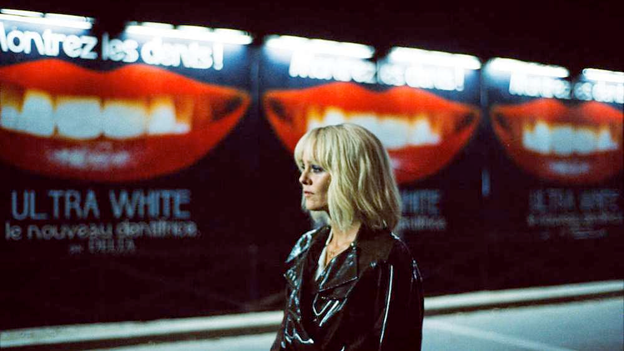
KNIFE + HEART
Director: Yann Gonzalez
Genre: Horror
As if France has declared peace with its centuries-old rival, KNIFE+HEART is a Parisian grindhouse giallo you’d swear came from the depths of Rome. Following an all-in Vanessa Paradis as Anne, a gay porno director on a mental tailspin, director Yann Gonzalez attempts to frame her psychological turmoil against the grisly murders of her actors, but the two never play with each other, rather mashing against one another like songs with radically different BPMs. KNIFE+HEART’s bizarre flourishes feel ripped from tongue-in-cheek parody, transplanted into a self-serious Argento rehash; the film struggles to top its perfectly macabre intro. To add insult to injury, the end credits hint at gorgeous, gay phantasmagoria that is never capitalized on or celebrated—grime is out, eroticism is in! Even if his characters are wrapped up in reconciling with past loves, Gonzalez has no interest in building on what came before him: he’d rather replicate it. With the glut of Eurohorror smut yet to be uncovered and treasured, I am hard-pressed to recommend a film that makes the implicit phallic terror of the genre this exhaustively unambiguous.
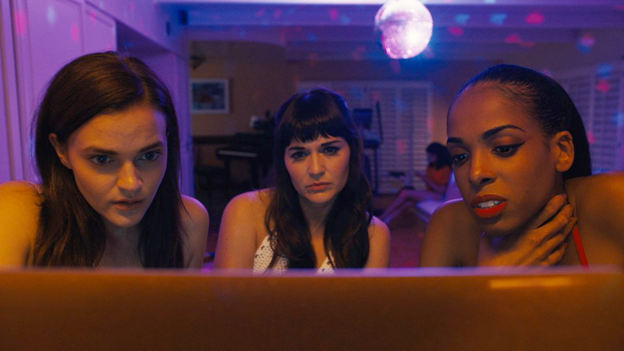
CAM
Director: Daniel Goldhaber
Genre: Horror
Screenwriter Isa Mazzei pens a fair THE OUTER LIMITS spec from an experienced and, relative to previous screen portrayals of sex workers, sensitive perspective, but her desire to shift the conversation fails to collude with the audience’s want for something new in CAM, a camgirl supernatural thriller with an alluringly existential concept executed as disappointingly straight-laced as possible. Tackling issues of identity in the digital era, CAM follows the trials of Alice, played by an impressive Madeline Brewer, as she’s locked out of her account by—herself. More adventurous storytellers would use this scenario for ultimate titillation, creating a film that fulfills the carnal desires of the horror fan then prosecuting them as their pants are down. And yet, CAM is mostly a by-the-numbers procedural, its conflicts solved through bouts of logic instead of reckoning of the self. Some of it works: most horror sources its cringe factor from bodily mutilation, but here? It’s an amateur model coyly addressing her devoted, tipping viewers by their user handles, which may be more painful to behold than any needle to the eye. There’s a great film to be made with this concept, but it’s diet even in the REPULSION-lite category.
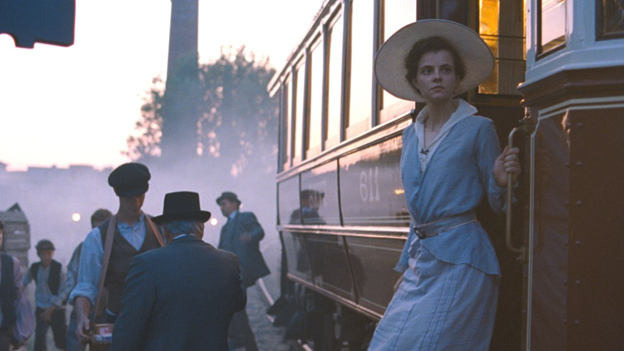
SUNSET
Director: Laszlo Nemes
Genre: Drama
SON OF SAUL was a great movie—or so I thought. Laszlo Nemes’ sophomore slump SUNSET makes me question everything. Whereas before the protagonist seemed to justifiably retain one-dimensional depth because he was traumatized from being in a concentration camp, here a woman who’s walking (and walking and walking, with almost parodically pervasive over-the-shoulder shots) through the Austro-Hungarian empire has the same exact amount of character development, which is to say none. So maybe, just maybe, Nemes doesn’t know how to write real characters? Maybe all he knows to do is really shoot his characters in claustrophobic close-up or over-the-shoulder at the expense of any other kind of shot? After all, nobody told him he couldn’t do that because he just won an Oscar. This film literally has an incredible opening shot (a painting) and last shot (a nearly non-sequitur trench tracking shot)—and a boring two-hour-and-20-minute running time to go with them. Ah, Laszlo. I still think you’re talented—just don’t blindly apply your style like an Instagram filter if the story (such as it is) clearly doesn’t call for it.
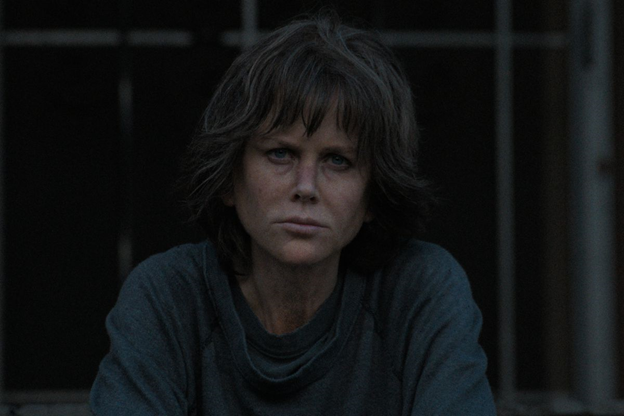
DESTROYER
Director: Karyn Kusama
Genre: Drama
There’s no doubt that Nicole Kidman is one of the greatest actresses working today. And though this may rank as one of her better roles, it’s mostly just her with the limited material given. Kidman, in a devastating makeup job, plays disgraced detective Erin Bell, who must hunt down the re-emerging LA gang leader who killed her undercover partner. Save for a somewhat neat ending that can catch some by surprise, it plays out mostly how one would expect. Kusama criminally underutilizes the immensely talented Tatiana Maslany and Sebastian Stan to focus on Kidman 10 whiskies deep. The result is an engaging character, but placed in an overtly gritty TRUE DETECTIVE or YOU WERE NEVER REALLY HERE crime story we’ve seen before. But thankfully nearly every time the film slumped into generic territory, a brutal, albeit brief, moment saved it. That, and the score by Theodore Shapiro is foreboding and fantastic. DESTROYER may be a worthwhile watch but definitely not above waiting for it on VOD. [Alec Larios]

ACID FOREST
Director: Rugilė Barzdžiukaitė
Genre: Documentary
Winning in the First Feature category at this year’s Locarno Film Festival, Rugilė Barzdžiukaitė’s ACID FOREST gestures towards something better, though what it achieves in its taut runtime is debatable. Much of the film is set around a viewing platform deep into a dying Lithuanian forest, seen from afar from the top of one of the few trees still standing. Dialogue from the deck is often hard to hear, drowned out by the cacophonous caws coming from offscreen, but what is audible makes clear the current state of affairs: the trees are dying due to the bird’s acidic shit, the byproduct of the fish consumed from a nearby body of water. Barzdžiukaitė has described her film as being concerned with the anthropocene and debasing the human feeling of superiority over the natural world; however, translated to the screen, this means little more for her than using clever edits and (horribly ugly) drone shots to attempt to replicate cinematically the moves and habits of the birds. In many ways, it plays like a lesser entry in the aftermath of the explosion of the Harvard Sensory Ethnography Lab: technically interesting, but often glib.

THE CHAMBERMAID
Director: Lila Avilés
Genre: Drama
Though it’s bound to be overshadowed by Cuaron’s ROMA considering it also follows a maid and is also set in Mexico City, THE CHAMBERMAID challenges its black-and-white sister’s epic scope with an intimate look at the daily routine of a camarista shot entirely within the confines of the InterContinental Presidente Hotel. Gabriela Cartol’s Eve does her best to keep her head down but humbly answers to every guest’s beck and call, whether it be those who want an exorbitant amount of amenities or even mothers needing their babies watched. But in holding onto hope that she can eventually spend some time with her own child whom she calls every chance she gets, Eve finds herself under the thumbs of even her coworkers. After a few too many broken promises of covered shifts and the dissolution of the hotel’s worker GED program, a broken Eve finally comes to her own. Major props to director Lila Avilés on a hard-hitting debut and personally teaching Cartol the actual cleaning techniques used by mucamas the world over. Films that shine light on those in the shadows should be treasured. [Alec Larios]

THE RETURN
Director: Malene Choi Jensen
Genre: Documentary
A hybrid of narrative and documentary, THE RETURN traces the lives of adopted Koreans on a quest to find their biological parents (and their place in society) after spending their lifetime abroad. Director Malene Choi aims her lens at Dutch-raised siblings, Thomas Hwan and Karoline Sofie Lee, who navigate the impossible bureaucratic minefield of Korea’s antiquated hospital records. In the process, the two leads meet dozens of individuals along the way who have experienced a similar fate, whether by being raised in the United States or elsewhere. It’s a sobering viewing experience, one peppered in bouts of quiet poetry, but I’d be remiss to say that THE RETURN doesn’t meander, oftentimes begging the question if it may have been a better 40-minute documentary and not a feature length genre-blend. Its key players are a delight to watch, and certain sequences could easily go on for another 10 minutes due to their emotional complexity, but the film’s musical interludes and brief asides often register as an attempt to shoehorn cinematics into a more pensive, meditative outing.
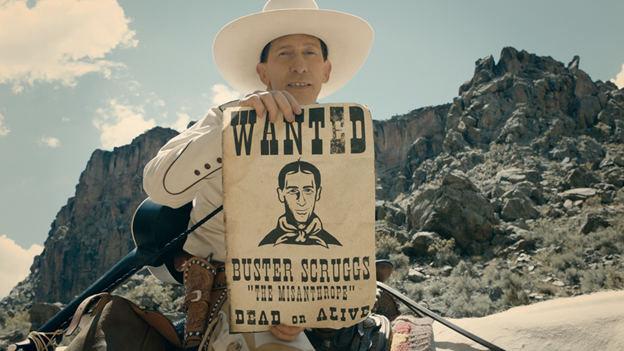
THE BALLAD OF BUSTER SCRUGGS
Director: Joel and Ethan Coen
Genre: Comedy
Joel and Ethan Coen re-emerge onto the scene with their first Netflix film, THE BALLAD OF BUSTER SCRUGGS. It’s their first anthology film outside of their excerpt in PARIS, JE T’AIME. Their first foray into streaming. And their first film shot on digital. It’s a collection of stories following men and women who have fate catch up with them. It’s not exactly invigorating material from the Coens, and though the two wordsmiths prove themselves capable as ever with the pen, it’s an undeniable fact that THE BALLAD OF BUSTER SCRUGGS really lags. Although none of these stories feel as inspired as one would expect, they do muster up a certain storybook magic, veering away from TRUE GRIT aesthetics, evoking the likes of THE HUDSUCKER PROXY in its stead. Unfortunately not all experiments pay off. THE BALLAD OF BUSTER SCRUGGS is certainly the Coens’ ugliest film to date. Tight frames accommodate a streaming platform, quite unbecoming of a western fairytale, and some of the color grading is a total wash. It’s hard to outright reject a Coen brothers outing, but this is the closest I’ve come to thinking about it since 2004’s THE LADYKILLERS.
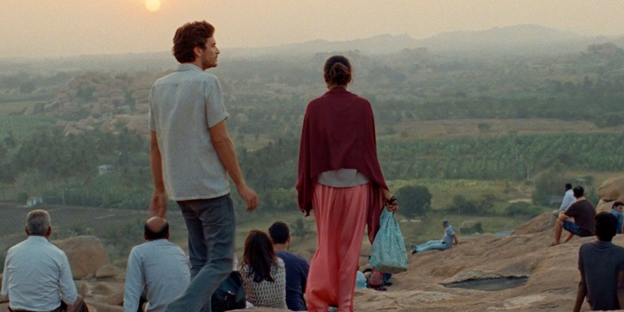
MAYA
Director: Mia Hansen-Løve
Genre: Drama, Romance
French actress-turned-director Mia Hansen-Løve’s ruminations still stir in MAYA as they did in 2016’s THINGS TO COME, but only to complement mellow meandering by Roman Kolinko and the occasional sacred sight of India shot by Helene Louvart, arguably the best female cinematographer working today, fresh from her stint shooting Alice Rohrwacher’s HAPPY AS LAZARRO. In both creating a pitchable premise and providing immunity to westerner wanderling syndrome, Kolinko plays war journalist and former ISIS captive Gabriel. Upon release he still feels uncomfortable at home in Paris, so he plans a trip to India. There his guide is the titular Maya, played by newcomer Aarshi Banerjee, who recently left school in London to get back to her roots. Whenever the film gives the slightest glimpse of a typical, idyllic commercial for India, Gabriel gets a curveball thrown at him by either the region or his past. This time, Hansen-Løve’s political prodding is present, but calmed with a more gentle approach that makes for a meditative, moseying film experience. [Alec Larios]

AKASHA
Director: Hajooj Kuka
Genre: Comedy
The age-old adage that “it takes a village” is tossed about in broad strokes, but in Hajooj Kuka’s narrative debut, AKASHA, the phrase describes the very means of the film’s production. Starring a slew of non-professionals from South Sudan, Kuka’s shaggy, no-budget-civil-war-village farce concerning a missing AK-47 overcomes its bevy of shortcomings through charming vindication alone. The acting is wooden, the facile comedy seeks laughs in concepts that would have been a riot in ‘59 (the middle act reaps all of its jokes from two men disguised as women), and, even with a 78-minute runtime, the sitcom narrative outstays its welcome. AKASHA marvelously achieves as a sort of travelogue wherein it works around a village’s natural, “direct cinema” minutiae and flounders when the inhabitants are bent to the whims of plot. There are indications of Hajooj Kuka’s potential, especially in the complex finale that elicits both warm-hearted satisfaction and harrowing chills, but his greatest accomplishment is in creating a cultural touchstone chock-full of personality that taps the West into a country it’d prefer to recognize as anonymous.
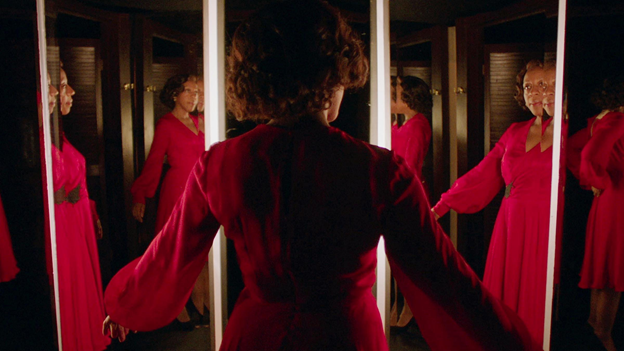
In Fabric
Director: Peter Strickland
Genre: Horror
IN FABRIC lives for the few nights within which I saw it—when it sits in front of a festival crowd who can cheer and jeer at all of its idiosyncratic parts that don’t quite add up to a cohesive whole (as is the case with all of pasticheur Peter Strickland’s pretty but hollow works). Its DEATH PROOF-esque structure of splitting the film into two mirroring halves does it no favors as far as audience engagement is concerned, but I did enjoy it. The image of the bald mannequin woman in the dumbwaiter is priceless, as is all her intentionally creepy line-readings. As a giallo nut, I certainly love the unabashedly retro credit design and music choices. But I don’t know. If I were watching this by myself on Netflix, I would have been interested for about 20-25 minutes before moving onto something else. As it stands, Strickland has yet to take that style and craft a cohesive story I want to engage with one-on-one.
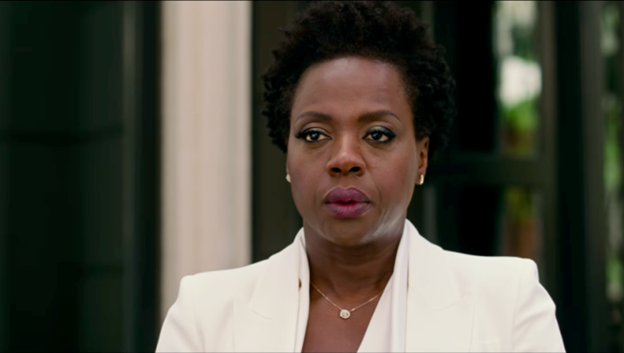
WIDOWS
Director: Steve McQueen
Genre: Crime Drama
Chicago really gets the cinematic short shrift. Even its most celebratory moments are in entitled rich kid Ferris Bueller parading through the gentrified bourgeois establishments, and here we are in 2018 with an Englishman and a white woman who attended Northwestern University delivering a political treatise on an urban environment they’ve claimed as their own. It was misguided when Spike Lee did it, and it’s just as ill-considered now. The gimmick of WIDOWS, Steve McQueen’s long-awaited follow-up to the still-masterful 12 YEARS A SLAVE, is “What if we gave the script of a 2 PM-on-a-Wednesday TNT syndicated action flick to an arthouse director?” and in that conceit alone, I’d bargain to call WIDOWS a deeply experimental work—a FIVE OBSTRUCTIONS motion picture with results catered to box office profiteering, momentary satisfaction, and not much else. WIDOWS is like watching 2018 HBO attempt THE WIRE: broad takes on nuanced issues filmed as loudly as possible with as many wasteful subplots as the creators can fit in. I cannot deny the immediate entertainment of WIDOWS, for McQueen can create viscera in his sleep, but I can certainly attest to its all-being non-permanence.

HAPPY AS LAZZARO
Director: Alice Rohrwacher
Genre: Drama
In what reads like a patchwork of Luis Buñuel’s VIRIDIANA and Kiezlowski’s formal tendencies, director Alice Rohrwacher’s latest feature film (and Cannes darling), HAPPY AS LAZZARO, is a quiet study of the proletariat finding their place as the slaves of the 21st century, unsure of whether their lives as unpaid farmhands may have been preferable to the false freedoms provided to them by the bureaucracies of modern Italy. It’s a relentlessly depressing fable, but one told with a distinct religious charm through the eyes of its martyr-like protagonist, the eponymous Lazzaro. His naive kindness and his gentle cadence calms the air of frustration, envy, and boredom that plague its characters—rich and poor alike. A young man who doesn’t exploit, and always willing to lend a hand, he becomes a patron saint for a population brought to its knees by a capitalist economy. It’s a profound portrait, and often a touching one too, but the lack of agency on part of Rohrwacher’s protagonist does begin to grate, and though her queries are undeniably compelling, HAPPY AS LAZZARO dips in and out of boredom as a result, never finding the external conflict to lay the foundation for a more compelling narrative.
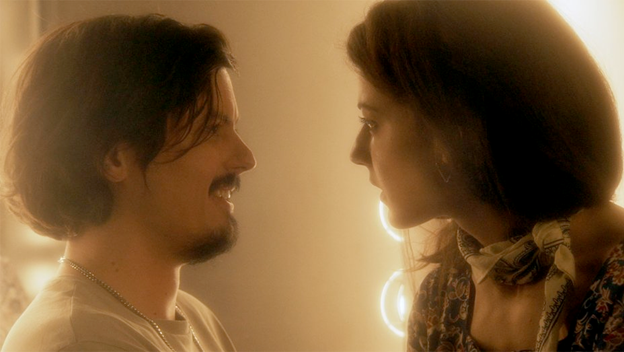
THE GREAT PRETENDER
Director: Nathan Silver
Genre: Comedy
From its colorful Fassbinder-esque visuals (captured by the best DP in the biz, Sean Price Williams, armed with only an A7S and some cutouts), to its sardonic Rohmer-esque dialogue, for better or for worse, Nathan Silver crafts a very authentic portrait of artists in Brooklyn in 2018. I found it gut-level funny (having related to many of its situations myself in New York), though I can see where it would be a little too inside-baseball for those not acclimated to the Brooklyn New Wave. Coming in at a brisk 70 minutes (I wish more movies could have the confidence to be this short), we’re given a menage a quatre of flawed artists who flounder in love and life. The sum total of its plot really does play second fiddle to individual wry observations and to its style (which I consider to be a main character in and of itself). While obviously done for budgetary reasons, its pervasive use of close-ups successfully shoves these real people straight in your face, and makes it impossible to look away. Watching this contemporaneously at the festival gives me the feeling that I’m watching a really good deep cut from an eventual auteur on a Filmstruck-esque site 35 years from now.
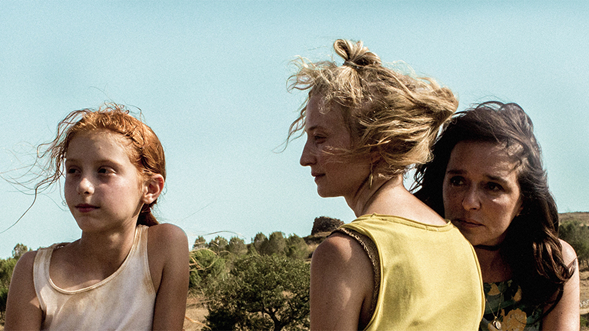
DAUGHTER OF MINE
Director: Laura Bispuri
Genre: Drama
On the Italian island of Sardinia, little redhead Vittoria finds herself in the middle of a custody battle between her two would-be mothers in DAUGHTER OF MINE. Caring but worrisome adoptive mother Tina, played by legendary Italian actress Valeria Golino, is at odds with fun-loving but alcoholic biological mother Angelica, whom Tina once loved and made a promise to keep her daughter safe. Alba Rohrbacher, sister of LAZARRO director Alice Rohrbacher and equally agonizing in Laura Bispuri’s previous SWORN VIRGIN, is an absolute knockout as the destitute Angelica. It’s hard not to feel every painful stumble she has or her growing bond with her formerly estranged Vittoria, played by exceptional first-timer and native Sardinian Sara Casu. Every scene in the bar Angelica frequents is intense, as Tina negotiates for Vittoria by offering to buy Angelica drinks, thinking she’s doing good on her adoptive daughter but fully knowing she’s in turn perpetuating her best friend’s bad habits. All three love each other so much yet are convinced that they know what’s best. A harrowing portrait of motherhood, DAUGHTER OF MINE was definitely a hidden gem of the fest. [Alec Larios]
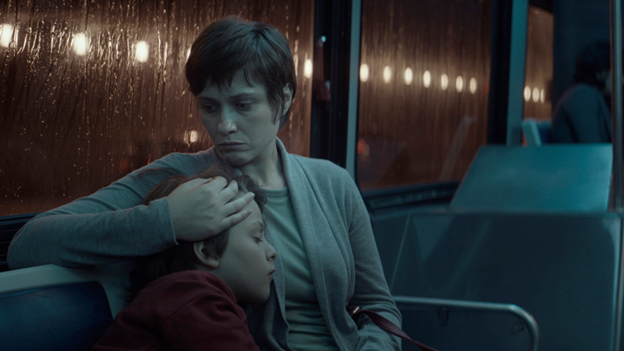
LEMONADE
Director: Ioana Uricaru
Genre: Drama
If the Romanian New Wave has been missing anything, it’s a female director. Few cinematic movements of the new millennium have gained as much traction as the works of Cristian Mungiu, Cristi Puiu, Corneliu Porumbouiu, and Radu Jude. With the growing acclaim of this neo-realist movement, it was only a matter of time before a woman would get her word in, contributing a new angle to a cinematic landscape marked by razor-sharp sociopolitical commentary. Cue Ioana Uricaru, a Romanian-born director and filmmaking professor at Vermont’s Middlebury College. Her debut feature, LEMONADE, captures the injustices and curiosities of American immigration through the eyes of a Romanian woman. Though the film’s antagonists occasionally register as ruthless caricatures, lead actress Mălina Manovici packs so much commitment into the leading role that she brings out the very best of the Romanian New Wave in the process. A film that feels part glossy American production, part fly-on-the-wall kitchen sink drama, LEMONADE is a welcome addition to the cinematic output of a nation that has—until now—remained firmly within its border.
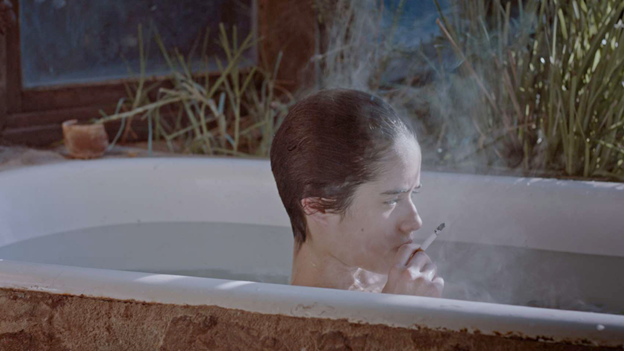
TOO LATE TO DIE YOUNG
Director: Dominga Sotomayor
Genre: Drama
In some ways, TOO LATE TO DIE YOUNG may appear to be an unexpected recipient of the Best Director prize at this year’s Locarno Film Festival. Though totally precise and gorgeous, Chilean filmmaker Dominga Sotomayor carries a light touch, contrary to the heavy gestures that often gain more attention. All the same, the film—a taut, poetic depiction of communal living in the late ‘80s, loosely drawing on Sotomayor’s experiences as a child—certainly compels. What perhaps stands out the most to my mind is how it almost entirely steers clear of the common depiction of communal lifestyles in art film, in which, as if we were still under the Hays code, it was as if all were mandated to end in tragedy. For the most part, TOO LATE TO DIE YOUNG is a totally comfortable and cosy ride, with its cool colors (contrasted with bright orange fire) proving to be quite relaxing. Though it does unfold, RULES OF THE GAME-style, into something else by the end, Sotomayor provides us with a rare delight: a film which is at once totally uninhibited and yet requires no gaudy appeals to our senses, allowing for a kind of casual pleasure.
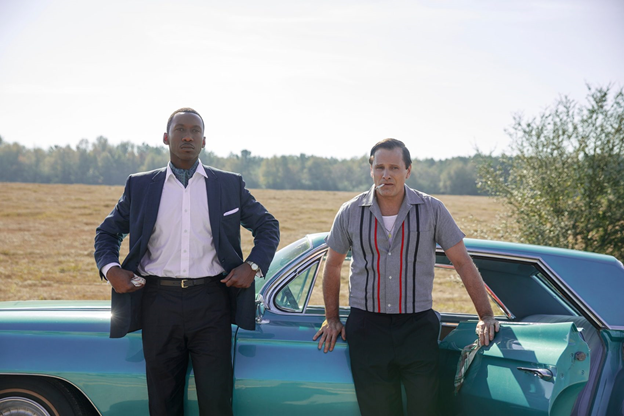
Green Book
Director: Peter Farrelly
Genre: Drama/Comedy
Boy, did this one surprise me! If you asked me what I was going to think of this before I saw it, I would respond to you with a comically broad Italian accent and scream, “HEEEEYYYY – DRIVING MISTAH DAISY!” in order to approximate what I thought was going to be a misguided gangster performance from Viggo Mortensen. Wow, was I wrong. The performance is gangbusters in context. The movie is great. And I emphasize the word movie as opposed to film. This isn’t a film—this is a movie. And as far as movies go, this might be the best movie of the year. It’s certainly the bona fide Best Picture winner of 1990—I love how old school and naïve this feels. It’s a genuinely heartwarming movie that I didn’t roll my eyes at once—it all felt earned. There’s nothing profound here, you’ve seen it all before, and if you want to pick it apart, it’s not going to stop you. But if you leave your cynicism at the door and let it take you where it wants to, you’re gonna see a great fucking movie. Because Mahershala and Mortensen are harmonious gravy together. The writing is sharp. It’s nostalgic and joyful in the best possible way. If you’re going to do Oscar bait, do it this way. You’re gonna feel great!
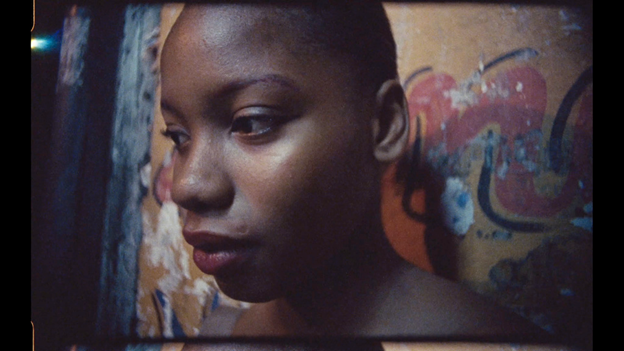
BLACK MOTHER
Director: Khalik Allah
Genre: Experimental
Since Stan Brakhage’s path-breaking WINDOW WATER BABY MOVING, birth films have become a modest motif in experimental filmmaking. Photographer-filmmaker Khalik Allah’s latest feature, BLACK MOTHER, fits well within the genre, organized around the three trimesters of a woman’s pregnancy. However, inasmuch as birth is the structuring force, BLACK MOTHER deals with it only peripherally, instead interested in a cross-section of life in Jamaica, considering questions of racial identity, class, imperialism, prostitution, death, faith, and the afterlife. It is a characteristically textured film, deploying different kinds of shots and images in its composite look at a country still reeling from the grips of new national freedom from colonial oppressors. Allah shoots with such modesty and respect, unfortunately uncommon in this style of filmmaking.

DEAD HORSE NEBULA
Director: Tarık Aktaş
Genre: Drama
In a famous early short, Stan Brakhage literally re-membered his dead dog, taking fragments of the body in images and assembling them in transcendent montage—cinema as the producer of positive forms of being. Tarık Aktaş, in his debut feature DEAD HORSE NEBULA, approaches the titular dead horse in a similar way, but to an opposite effect. There is a violence to his images, magnifying the body as the site of decay. A threat is posed in every close-up, under the scrutiny of the bright, burning key light (magnification as a Heisenbergian weapon: get too close and the object is gone). Aktaş took home the Prize for Best Emerging Director in the Filmmakers of the Present section at this year’s Locarno, an award well deserved. Though at times, DEAD HORSE NEBULA plays on the hits and cliches of Locarnos past (one particular scene feels almost entirely lifted from last year’s Golden Leopard winner, Wang Bing’s MRS. FANG), there is nonetheless an exciting novelty to how Aktaş approaches the world through the camera, a potency one hopes is developed in more sustained future work.
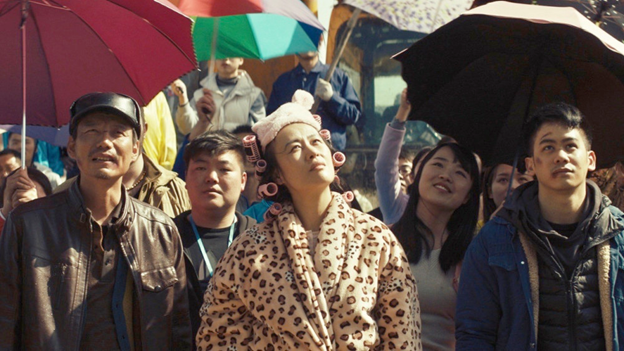
DEAD PIGS
Director: Cathy Yan
Genre: Drama
NYU alumni Cathy Yan is on a fast track to success. With a Harley Quinn standalone film on the horizon, it goes without saying that her debut film, DEAD PIGS, is quite the unique specimen. Few directors cannonball from foreign language drama straight to multi-million dollar blockbuster, after all. DEAD PIGS is a unique dramatic satire of Chinese culture, fueled by a cinematic eye that bears resemblance to the work of Jia Zhangke. Building an Altman-esque ensemble, DEAD PIGS’ parallel narratives neatly collide through the relationships that its key players share with one another, all against the intense backdrop of bustling Shanghai. It’s an exploration of a constantly evolving “capitalist” landscape, where family heirlooms are demolished, giving way to towering condominiums, deftly exploring China’s obsession with all things modern, western, and specifically, European. It’s an admittedly western glance into Chinese culture, but it’s undeniably astute. Oh, and those subtitles—you’ll know it when you see it, that’s all I’ll say.
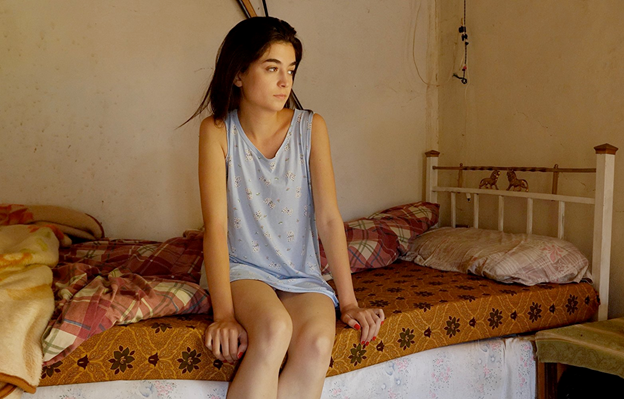
YARA
Director: Abbas Fahdel
Genre: Romance, Drama
Iraqi filmmaker Abbas Fahdel last appeared on the scene three years ago with his equally daunting and haunting documentary, HOMELAND: IRAQ YEAR ZERO, a six-hour chronicle of the United State’s imperialist occupation of Iraq. In light of the gravity of that work, it is difficult to then imagine what to do next. YARA, his latest film, and second narrative venture, appears to be in many ways a pivot in style. It is the kind of film so light in approach that it’s easy to fail to take it seriously, though to do so would be a great mistake. Quiet as it is, YARA is immaculately detailed and thoughtful. The debt Fahdel has to neorealism is palpable, though Fahdel often beats the Italians at their own game. Inasmuch as this is a narrative film, Fahdel’s style remains documentary, looking over the world with a rare sense of genuine equality. What interests Fahdel is connection. Wonderfully calm and delightful, and one I’m afraid far too many will wrongfully dismiss. There is unlikely to be any other film released this year with a greater sense of grace.
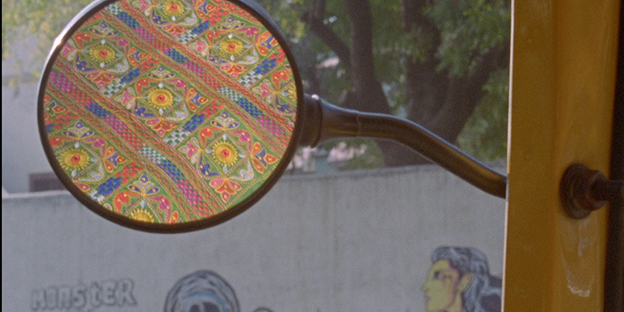
THE GRAND BIZARRE
Director: Jodie Mack
Genre: Experimental
To call it the culmination of a decade’s worth of study seems too dismissive of her marvelous short film work, but certainly Jodie Mack’s new feature is properly titled. THE GRAND BIZARRE is without a doubt a grand entrance onto a wider stage for Mack, whose experimental animation has already made her a mainstay in avant-garde shorts programs worldwide. In many ways, this sophomore feature maintains themes frequent to her catalogue, most prominently the exploration of the phenomenological effect of clashes in color, texture, and pattern, commonly involving household objects of intimate familiarity, such as her BLANKET STATEMENT films, which take as their source homemade, knitted blankets. At feature length, the ambition of her work expands further, developing connections between the patterns of textile fabrics, topological mapping, the structure of language and script, and the flows of global capital. Intricate and overwhelming as it can be, however, THE GRAND BIZARRE loses nothing of Mack’s warm and playful personality, often set to a score made from her own voice or everyday digital beeps (the biggest bop is probably one composed using the Skype bloops). An essential work of the year.

DIAMANTINO
Director: Gabriel Abrantes, Daniel Schmidt
Genre: Comedy
It’s a rare miracle when a film at a festival as prestigious as AFI Fest is as balls-to-the-walls hilarious as DIAMANTINO. It’s even less common for said film to hold its world premiere at the Cannes’ Critics Week and win top honors (including a treasured Palm Dog). A quasi old school exploitation yarn, DIAMANTINO follows a—quite literally—empty-headed soccer sensation through the tough weeks following his father’s death. Grief stricken, and guilt tripped for losing a penalty kick at the World Cup, our eponymous lead gives up the sport, adopts a refugee from Mozambique, only to soon discover that she’s actually a lesbian undercover agent sent to track the money his two evil sisters are laundering through offshore accounts. It’s as much a film for our precarious political climate as it is a wacky absurdist farce; insofar that it capitalizes on a lot of the qualities that made SORRY TO BOTHER YOU such a success, only that DIAMANTINO manages to rise above and commit wholeheartedly to its surrealism in a way that makes the entire ride all the more lovable.
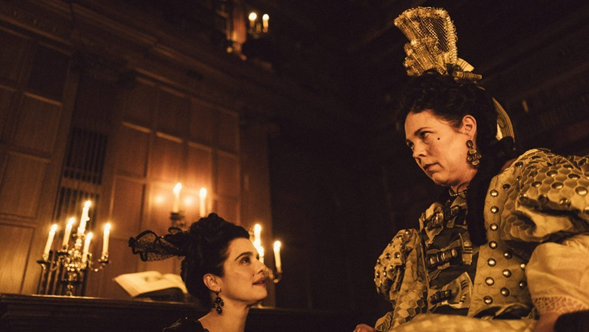
THE FAVOURITE
Director: Yorgos Lanthimos
Genre: Comedy
A project nearly a decade in the making, it almost seems Lanthimos’ persnickety style would have already been implemented in an 18th-century period piece set in the court of Queen Anne. It’s rare that Yorgos doesn’t have a writing credit, but the impeccably slick wit of Deborah Davis and Tony McNamara fits so well with the sadistic director’s sense of humor. While war with France wages afar, the English throne is occupied by Olivia Colman’s selfish and sickly Queen Anne. Questions of her waning power grow in her counsel and her trust lies solely with longtime confidant Lady Sarah Churchill, played by the amazing Rachel Weisz. Literally thrown into the scene is Abigail Hill, portrayed by Emma Stone, who quickly catches the Queen’s eye and threatens Sarah’s influence. The ensuing games of jealousy and heartbreak play right into Lanthimos’ penchant for outrageous antics while slapstick and bunny rabbits abound. Cinematographer Robbie Ryan’s dynamic camera depicts rowdy duck races and old English opulence with a prominent fisheye lens that’s effective in creating a voyeuristic feel in line with the onscreen naughtiness. It’s downright impossible to not giggle or gasp through this incredible romp that ranks among this director’s best. [Alec Larios]

COLD WAR
Director: Paweł Pawlikowski
Genre: Romance
Following up his unorthodox Oscar winner, IDA, director Paweł Pawlikowski directs his camera away from young novitiates and toward star-crossed lovers. Exploring the history of post-war Poland, COLD WAR follows musicians on their quest to preserve national identity through the enrichment of folk music. What starts as a wondrous sandbox for singers and fiddlers is quickly contorted and co-opted into communist propaganda. Musicians flee, finding new homes in France, exploring the booming jazz scene of the ‘50s, only to feel robbed of a distinct national heritage. Polish chansons of heartache give way to seductive jazz crooners. Lyrics are mangled, performances are forced, and identities are commodified. It’s an intensely complex subject, and Pawlikowski lays the foundations for a meaty query. Though Pawlikowski never quite sits still in one place, the claims COLD WAR makes are daunting, an expert study of how our government-mandated political borders cause unwanted friction among ourselves, our art, and those we love.
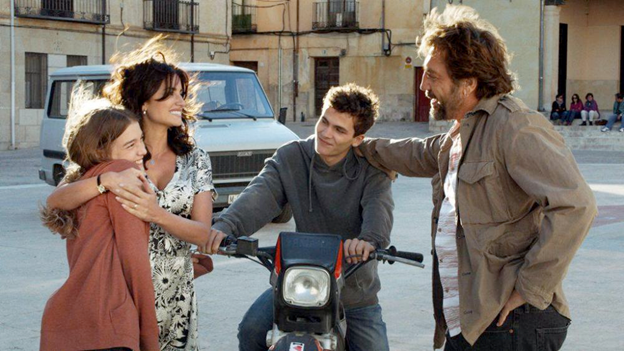
EVERYBODY KNOWS
Director: Asghar Farhadi
Genre: Drama
Asghar Farhadi doing a Pedro Almodovar-style kidnapping mystery is exactly the thing I never knew I needed! Perhaps EVERYBODY KNOWS’ greatest asset is that it somehow still manages to be more than just a good thriller. The class dynamics that Farhadi imbues within this story are outstanding, stirring a devilish pot of jealousy, familial unrest, greed, and affluence. What begins as a generic tale of lost love amidst a family tragedy slowly but surely escalates into a brilliant study of a family’s internalized desire to take down the servant boy who grew up to outrank them. The melodrama is dense here, and the weaving of Almodovar’s and Farhadi’s aesthetics is palpable. Bardem, whose face looks like a monument chiseled in rock, delivers an incredible performance of internalized guilt, anguish, and insecure altruism. It’s a huge shame that Farhadi shoots himself in the foot by dedicating an offbeat five minutes to revealing the kidnappers—especially because he so expertly guides our eyes to small clues throughout the narrative. But nonetheless, brace yourselves, this one’s a kicker.
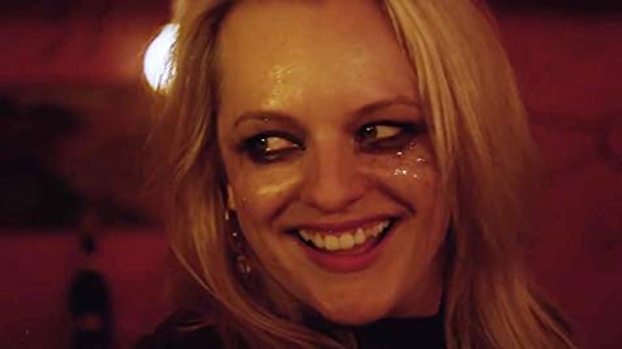
Her Smell
Director: Alex Ross Perry
Genre: Drama
Elisabeth Moss is a force! Alex Ross Perry finally graduates to the big leagues (not to mention 35mm film stock) and makes his best film yet. HER SMELL is a five-act chamber piece that could physically be done on the stage, but would lose all of its intensity due to its baked-in, Cassavetes-esque technique. We are taken to hell and back (peak hell being the violently red and loud third act). It feels like the gloriously grimy cinematic equivalent of the vinyl section of the legendary, now defunct Kim’s Video in NYC that Perry used to work at and I used to frequent. Act four features what’s sure to be one of the best moments of cinema this year—a long take with Moss sitting with her daughter at a piano (inspired by Bergman’s AUTUMN SONATA), singing a heartbreaking cover of “Heaven” by Bryan Adams. See it to believe it, you’ll be floored. Also, it really helps that the songs are actually good as Perry ironically apes JOSIE AND THE PUSSYCATS in the way he films the concert scenes with a crane. Lot of Verhoeven in there too (particularly SHOWGIRLS). Drop the needle for this lick.
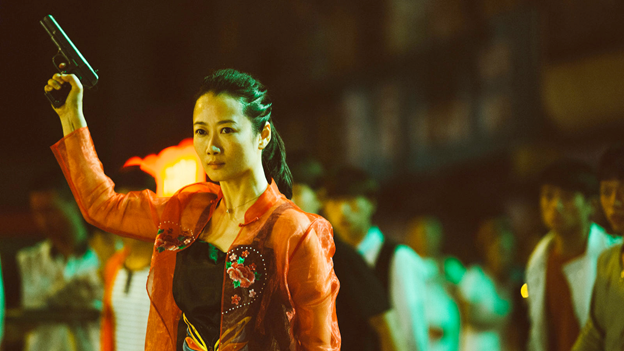
ASH IS PUREST WHITE
Director: Jia Zhangke
Genre: Drama
Since 2013’s A TOUCH OF SIN, China’s premier filmmaker has increasingly turned toward more commercial work and ASH IS PUREST WHITE is no different, here interested in a close examination of the gangster picture. Unlike a filmmaker with lesser talent, however, nothing is lost in this transition: Jia Zhangke remains an observant filmmaker and a patient one, bending the limits of genre to fit his career-long interest in the unfurling of time and spatial development as it relates to the shift in China’s political make-up. Though a gangster film on the surface, Jia’s interest never leads us to the intricacies of the criminal underworld; instead, he remains attentive to the loss in change: loss of employment, of land, of fraternity, of honor, and of privacy. His reference points are likewise as historical as they are cinematic (the careful viewer will note that one key scene inverts Rossellini’s STROMBOLI, while another pivotal one refers us to VERTIGO). Over two decades into his career, Jia remains ever strong.
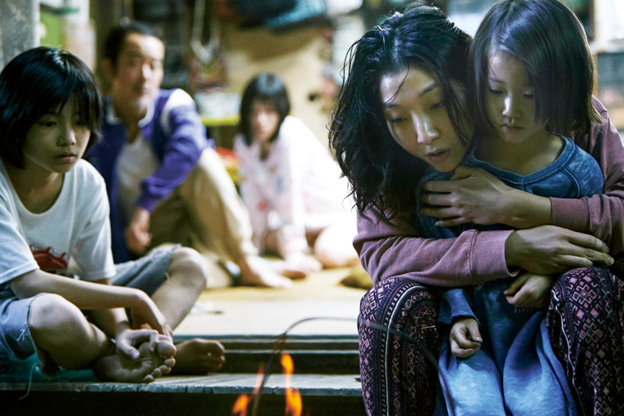
SHOPLIFTERS
Director: Hirokazu Koreeda
Genre: Drama
Hits are hits for a reason, and SHOPLIFTERS may well be Hirokazu Koreeda’s chart-topping single. Thematically dense, expertly performed, and weaving together a gaggle of intricate performances, Koreeda’s Palme d’Or-winning follow-up to his murder-mystery, THE THIRD MURDER, certainly registers as a logical return to roots: an ensemble drama about income inequality in modern-day Japan, and the moral quandary of whether or not individuals who are perceived as dishonorable may actually be the most empathic of us all. Never quite reaching the emotional peak of Koreeda’s 2016 darling, AFTER THE STORM, SHOPLIFTERS makes up for a light third act slump through the rich tapestry of its massive ensemble. Yes, it does truly register like everything predating this opus was somewhat of a practice run, using smaller ensembles and easier staging to test the waters of SHOPLIFTERS’ class-system dissertation. It’s oftentimes unwaveringly traditionalist, utilizing music and iconography just as you’d expect any tear-jerker to do, but I’ll be damned if this doesn’t make you run and kiss your family.

Vox Lux
Director: Brady Corbet
Genre: Drama
What an opening! Scared the shit out of me. Don’t take the trigger warning: just experience it, and if you’re traumatized, you’re traumatized. That’s cinema. Good cinema that makes you feel something. But Brady: what chutzpah! VOX LUX is not a perfect movie by any means, but the highs are so high that you really don’t care. The epileptic flashes through the tunnel. Willem Dafoe’s indulgent narration. The titles over haunting shots of an ambulance on a cloudy day. Natalie’s choker. Molto elegante! A great companion piece to HER SMELL (both of which are music films that further underscore just how much BOHEMIAN RHAPSODY sucks). A fascinating, self-proclaimed portrait of the 21st century that weaves trauma of all sorts (mass shootings, 9/11, abrasively glitzy pop music), turns a mirror on its audience, and breaks the glass with a kick in the ass. This is an experience. A stepping stone for a filmmaker who is sure to become a top auteur in 15 years. It’s confident even when it’s wrong, and that’s okay—because it is a voice. A singular voice. It is VOX LUX.
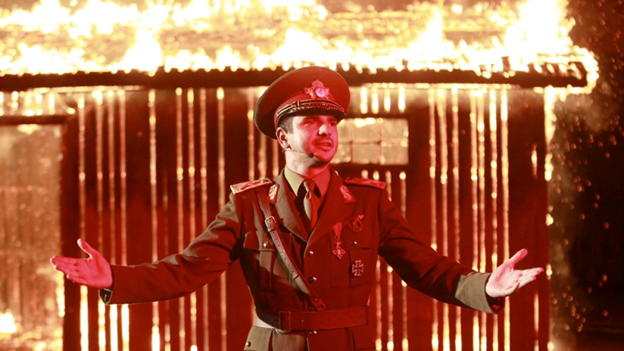
I DON’T CARE IF WE GO DOWN IN HISTORY AS BARBARIANS
Director: Radu Jude
Genre: Comedy
A real-life version of BORAT’s “Running of the Jew.” I DO NOT CARE IF WE GO DOWN IN HISTORY AS BARBARIANS is a razor-sharp query on how our national pride far outweighs our capacity to feel shame for the crimes of our ancestors. It is the perfect film for an era of rampant nationalism, the exact post-Brexit, post-Trump satire we need. Director Radu Jude deftly follows up his outstanding previous film, AFERIM!, with this far more pointed socio-political critique, an attempt to zoom in on a number of subjects addressed in his prior outing. I’ll be the first to admit that the entire endeavor is shamelessly academic, a complex work of intellectual cinema that is sure to alienate a bulk of its target audience. But frankly, Romanians don’t really watch Romanian films to begin with, so why bother making this film for them? If they see it, great! If they don’t, then at least Jude is spreading his gospel in art house communities worldwide. Certainly the most demanding film I’ve seen in months, and thanks to his signature use of sardonic humor, this may just be the most inside baseball Romanian cinema has ever gone.
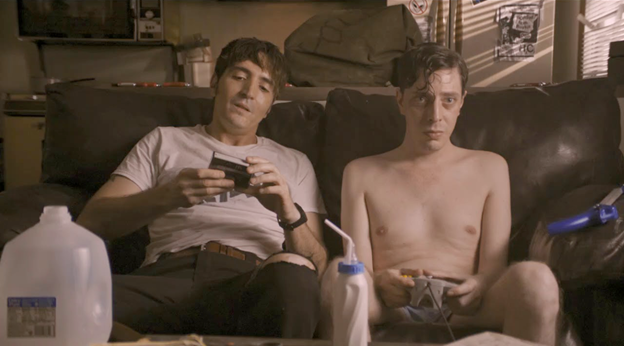
RELAXER
Director: Joel Potrykus
Genre: Comedy
If you’re cool enough to vibe with Joel Potrykus’ unique visual cadence, then you’ve likely already found yourself deeply immersed in his filmography. From APE, to THE ALCHEMIST COOKBOOK, to BUZZARD, few DIY filmmakers have established such a unique brand for themselves in such a short period of time. With his gaggle of actors and crewmates, RELAXER is yet another unmistakable entry in Potrykus’ oeuvre, an underground torture chamber for his go-to actor, Joshua Burge. I can continue to wax poetic about how RELAXER is a prime example of my ongoing American Digital New Wave theory, but I’d be doing this film a disservice to only talk about it in such esoteric terms. RELAXER is vile: a putrid, synergetic masterstroke. It’s the type of film that’s so darn easy to make, yet so difficult to do well. I’m honestly jealous I didn’t have this idea myself. Few films have made me choke on laughter quite like RELAXER. It’s the dirtiest of films. A wunderkind of 21st century lo-fi cinema.















Comments